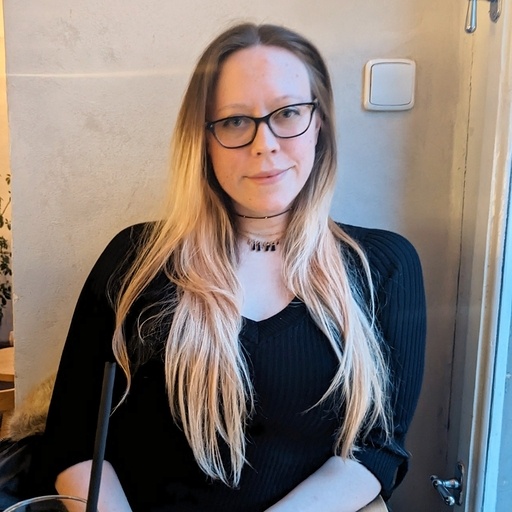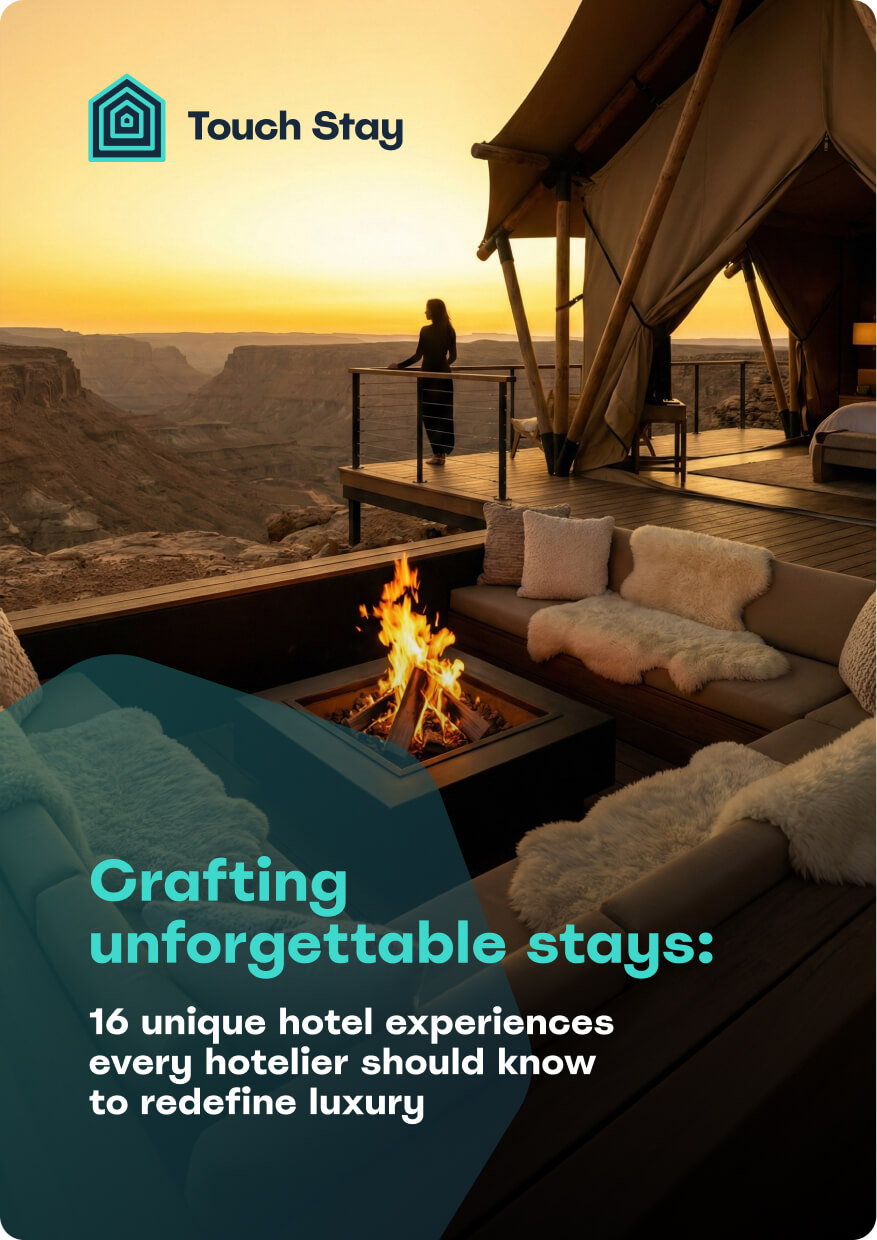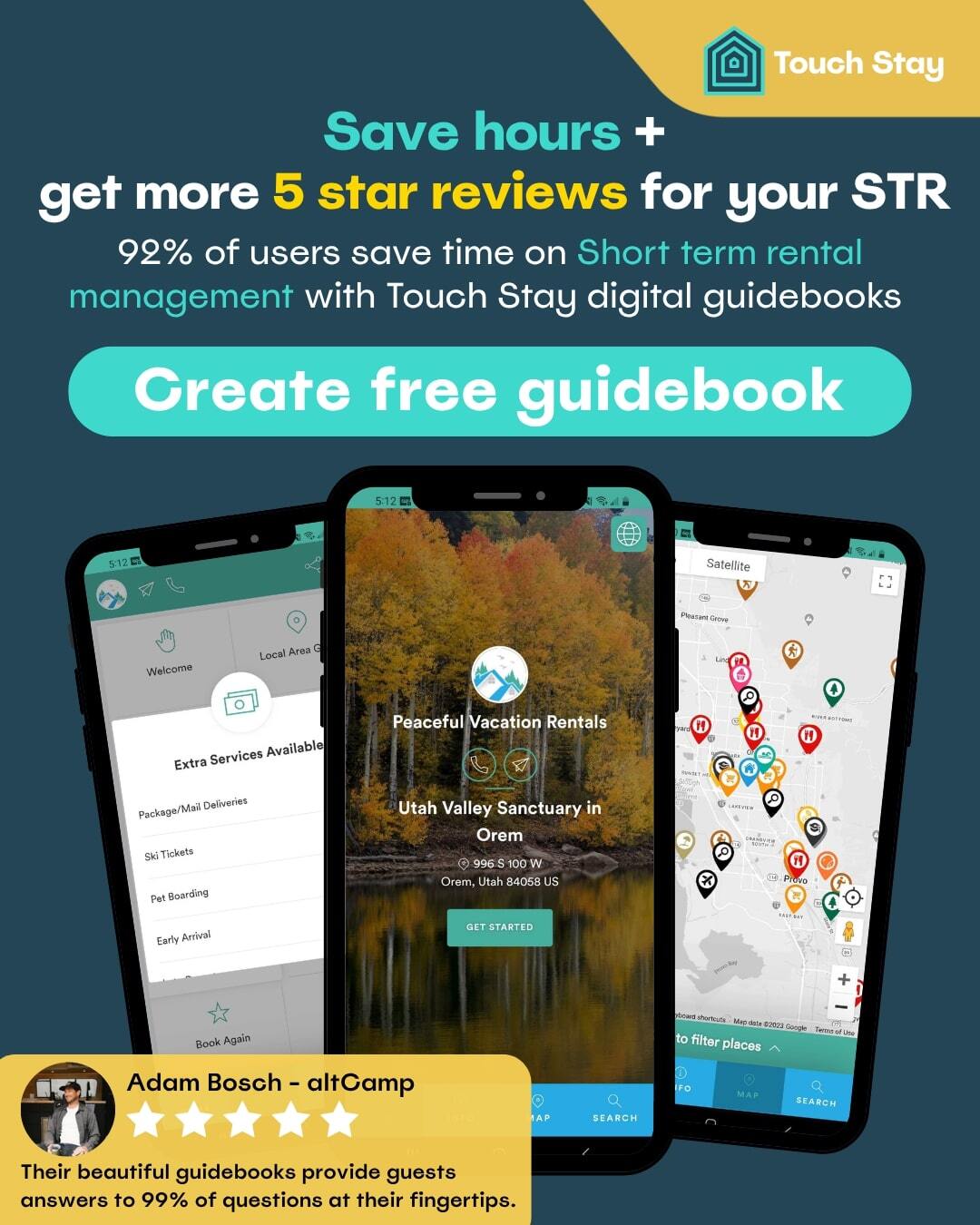Online travel agencies (OTAs), such as Vrbo, Airbnb, and Booking.com, are a hugely helpful resource for holiday rental owners who are just starting their vacation rental business. More than 150 million guests have booked stays through Airbnb – that’s a lot of potential eyes on your property. Plus, you don’t have to invest in any infrastructure or tech, you can just create a listing and off you go.
This would be ideal if OTAs were charitable organisations, offering their services for free (we can dream!). Instead, just like us, they’re businesses – which means that they want to make a profit. And so, on one hand they’re helping you to find more guests and take more bookings, but on the other hand they’re taking a chunk of your earnings through their commissions.
What to do?! Well, we’re not going to suggest that you abandon the OTAs altogether. They’re always going to show up first on search engine results pages, and they’ll always help you to find new guests.
What we do suggest, is that you start taking direct bookings, either through your own website or through social media (or both!). This way, you still get exposure from OTAs, but you retain more control over your property and your earnings. Plus, if you’ve been wondering how to get more bookings, this could be the way to go.
Not convinced? We’re going to outline the six key benefits of direct bookings for vacation rental owners, and point you towards some industry friends who can help you to get started.
What do we mean by direct bookings?
Just to make sure we’re all on the same page!
Direct bookings are any bookings that come directly to you, with no third-party facilitating the connection. They’ll most likely come through your direct booking site – a website you’ve created to market your property and to allow people to book with you. They might also come through your social media profiles.
By contrast, bookings which you receive through Airbnb, Vrbo, Booking.com, etc., involve third-party sites. These OTAs connect guests to vacation rental properties and host the booking process. These aren’t direct bookings because it’s not a straight line from you to the guest.
So, why is it worth taking bookings direct?
1. You avoid booking site commissions
At some point you’ve probably wondered, “how much does Booking.com/Airbnb/Vrbo take in commissions”? Well, on average, booking sites charge around 15-20% commission. Some of this will come out of your nightly rate, and the rest will be added onto the guest’s subtotal. To make it a bit clearer:
The global commission rate average for Booking.com is 15%
This means that around the world, on average, short term rental owners on Booking.com are giving the platform 15% of their earnings from each booking. That’s 15% that could otherwise go into your bank account.
Airbnb charges hosts 3% of their booking subtotal
Airbnb does things slightly differently. They generally charge hosts 3% of the booking subtotal, and guests 14% of the booking subtotal.
They’ve helpfully illustrated that for us: if a host charges $360 for a three-night stay, $10.80 (3%) is deducted by Airbnb, and the guest pays an extra $50.40 (14%). So:
- the guest pays $410.40
- the host earns $349.20
So, you have a guest who’s willing to pay $410 for three nights in your short term rental property, but you’re only receiving $349.
We’re not trying to slam the system here: Airbnb connects you to guests, provides customer support, and lends a sense of legitimacy which makes guests more likely to trust you. They’re providing a service, and it makes sense that they’re paid for this.
However, if you can also start taking bookings directly through your own website, then all of these earnings can start to land with you. You can then invest them back into your vacation rental business.
2. You can offer a better price to your holiday rental guests
If you don’t have to pay commission, then your profit margins increase, and this means you can offer lower prices to your guests whilst still earning more yourself. As well as offering lower nightly rates in general, you can also offer more discounts.
Discounts are a really great way of letting repeat guests know that you value them, and can help you to fill up empty spots in your calendar by getting more bookings in the low season. You could offer a reduced rate:
- during the end-of-year booking lull
- around holidays, such as Valentine’s Day or Easter
- on the anniversary of a guest’s first stay with you
By offering guests a special reduced rate, you solidify their brand loyalty and encourage them to return. If you’re not paying commissions, this doesn’t have to eat into your overall profits.
Encourage short term rental guests to return with a digital guestbook
Who doesn’t love a discount? It’s definitely likely to prompt a return visit from us! But, you know what people love even more than a discount? A brilliant experience and a set of lasting memories. Touch Stay can help you to provide this.
Holidays should be exciting, relaxing, and dreamy, but they’re also often slightly stressful. Guests are probably in an unfamiliar region, perhaps a new country, and they’ve had to cope with a lot of logistics to even arrive at your holiday rental.
The surest way you can encourage guests to return is by taking the stress out of their travels wherever possible. A Touch Stay digital guest welcome book includes all the information they could possibly need, alongside your personal local recommendations. You can send it to them well in advance of their stay, so they feel prepared before they even arrive. Find out in more detail how a digital guidebook boosts your guest experience offering.
Welcome a set of happy, relaxed guests who are perfectly primed to enjoy every minute of their stay with you.
3. You can build stronger customer relationships with your guests
A direct booking site helps you to build your brand, and encourages guests to associate their stay with you rather than with Airbnb.
Your own website offers the opportunity to showcase your logo, your tone of voice, and your colour palette, to really solidify your spot in guests’ memories. If you can provide a smooth booking process and an exceptional stay, then guests will remember you and will know exactly where to go to book again.
READ: how hosts can ace the holiday let marketing game to find out more about how your digital marketing can encourage guests to return, and how to build a direct booking website.
Communicate with vacation rental guests on your terms
Booking sites often have their own guest messaging systems, which can come in really handy for communicating with guests securely.
If guests book direct, you’re entirely in control of your communications. Whilst this brings an extra layer of responsibility, it also frees you up to use the communication channel that works best for you. We always suggest using a whole range of methods, so that you hit every different type of guest. You could start with:
- SMS/text
- Scheduled messages via your PMS
- Telephone calls
- Digital guidebook
- Carrier pigeon (if you’re feeling brave!)
There’s plenty of vacation rental software designed to help you communicate with guests on your terms, outside of booking platforms. iGMS, for example, offers a unified inbox as part of its direct booking management toolset. You can access all of your guests’ guest messages alongside all their booking info, and keep on top of your bookings wherever they’re coming from. Plus, it’s easy as pie to include the link to your Touch Stay digital guidebook in these messages.
Touch Stay digital guidebooks support these communications by giving your guests all the info they need before they arrive at your property. You can send them the link to your guidebook via your property management system, any other preferred channel (e.g. WhatsApp), or schedule automatic messages from your Touch Stay account. You can even send deep links to specific info that you want guests to see there and then.
Guests who are familiar with your holiday let before they arrive, means they’re less likely to pepper you with repetitive questions. They can relax into their stay, and you can reclaim time for other things!
4. You have control over how you present your vacation rental property
OTAs limit listings to their format, their character limits, and their amenities list. Of course, you can make your listing pop with a catchy title, an engaging description, and some polished photos, but you don’t have much freedom to make it your own.
With your website and social media, you’re in control. It’s this control that allows you to build your brand in the way you want to. You can present your photographs and property information in whatever format you’d like. The sky’s the limit!
For example, Tyann, Touch Stay’s Queen of Guest Experience, has created a page for each of her properties, where she describes the space in detail and provides a full gallery of photos. Users get a far more comprehensive, enticing overview of each property than they would on a listing site. Check out The Bee’s Knees if you’re looking for some inspiration!
You also have more space to tell prospective guests about yourself. You can fill them in on:
- why you started your vacation rental business
- what you enjoy about hosting
- why this area/property is special to you
- your interests outside of hosting
This info helps to establish a personal connection with your guests, which further bolsters their brand loyalty.
5. You’ll diversify your rental booking sources
OTAs can choose to change their commission rates, their policies, their algorithms, etc., at any point in time. From one day to the next, you could find yourself paying a larger chunk of your booking subtotal, having to comply with different regulations, or dropped to the bottom of their listing page. They might even go bust!
So long as guests can only find your property on listing sites, then you’re completely dependent on them. Any changes could seriously impact your income.
As a starting point, we recommend using a variety of listing sites. It might sound like this will make it difficult to keep up with your bookings – what if guests book the same dates on two different sites?! – but there are tools that can ensure this doesn’t happen. For example, a channel manager will keep a virtual eye on all of your booking channels, to maximise your reservation dates and avoid any double booking.
From here, creating your own direct booking site gives you complete control over where and how your property appears. You’re no longer reliant on third party sites, and can rest easy knowing that guests will always be able to find you.
6. Direct booking sites attract holiday rental guests for longer stays
And longer stays equal less hassle for you!
VRM intel has done a whole load of cool research on direct bookings, and one of the results they found was that the average stay value for a direct booking is more than twice what it is for a booking with Airbnb.
This is partly because direct bookings tend to attract a longer length of stay. This is great for you as the host because it means that you have to do fewer turnovers. If you’re paying a cleaning team, you have lower costs, and if you’re doing all the operations yourself, you save time.
Either way, you have more time and money to put back into your short term rental business. That’s a win in our books!
WATCH: our webinar on photography and direct bookings to discover how to attract more direct bookings.
So, should you abandon Airbnb?
No! OTAs such as Airbnb are the key way that new guests find your property, and that’s not going to change any time soon. They put your short term rental out there for the world to see, which is handy (to say the least!).
WATCH: the role of guest review scores in listing site rankings to get an insight into how to get more bookings on Airbnb, Vrbo, Booking.com, etc.
What we’re saying is that by taking direct bookings as well, you have more control over:
- your relationships with guests
- how you present your property
- your earning potential
So, if you don’t already have a direct booking site, or at the very least a means of taking bookings through your social media, now’s the time to set it all up.
Use a digital guidebook to fuel direct bookings
Taking on another booking method requires an investment of your time (we promise it’ll be worth it!). To help you save time in other areas, take advantage of the tools available to you. One of the tasks that absorbs a huge chunk of hosts’ time is communicating with guests. Responding to all of those queries and confusions really adds up!
This is where Touch Stay can help. Easily input all of your property info and local recommendations into our digital guidebook software, and watch as your guests glide through their stay without asking you anything! Everything they need to know is right at their fingertips.
Once you’ve got your direct booking system set up, you can use your digital welcome book to direct guests towards it, and tell them about any returning guest discounts you might offer.
Our Touch Stay Champions have also imagined creative ways to use their guidebook as a marketing asset. For example, Jamie Firth, of Dallow Hall Barns, runs social media ads which direct potential guests to his guidebook. This strategy pushes interested travellers towards an in-depth insight into his property, where they can see the effort and care that Jamie puts into the guest experience.
So, Touch Stay helps you to attract more guests, and ensures they have the time of their lives whilst staying with you (and that they don’t pepper you with time-consuming questions!).

Laura Clayton
Laura Clayton is a copywriter with a BA in fiction writing from Columbia College Chicago. From holding a position as a background investigator retained by the United States government, to teaching English, and writing about real estate, Laura has a diverse and varied background. She has been writing for SaaS companies since 2019 in a wide range of industries.
Be the first to know!
Join our newsletter for early access to:
- ✅ Free guides
- ✅ Pro tips & tricks
- ✅ Time saving tutorials
- ✅ Latest blog posts
- ✅ Checklists & templates





















